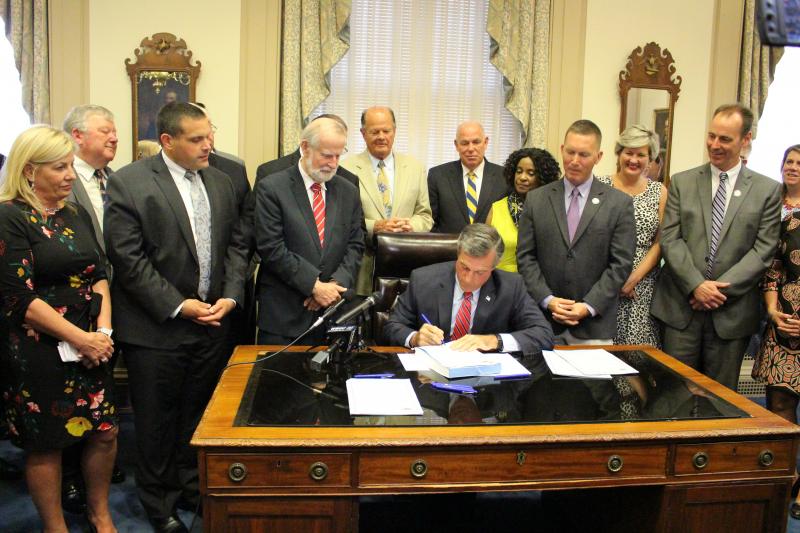Billed as the second earliest passage in recent Delaware history, the state's $4.45 billion budget for 2020 was signed June 25 by Gov. John Carney after receiving final legislative approval the same day.
Public education is the big winner with more than $100 million going toward high-needs schools. Teachers get a 2 percent raise and state workers get a $1,000 annual raise. Another $15 million goes to salary increases for state workers based on years of service and experience.
A separate bill passed by the Legislature and signed by Carney provides $62 million in one-time appropriations for public school enrollment growth, Medicaid growth, election machine maintenance, and medical and pharmacy costs for inmates. More than $100 million was set aside in reserves for future use – a pot of money that can be used in economic downturns.
The bill limits operating budget growth to 4.2 percent – an increase from the 3.9 percent Carney's budget originally proposed – but still less than the 6 percent revenue growth over last year posted by Delaware Economic and Financial Advisory Council on June 19. As of now, DEFAC has projected a conservative revenue increase of .75 percent for next year and a 2 percent increase in 2021.
“This is a responsible budget that focuses on Delaware’s future, with important investments in education, in our state employees, and in healthcare,” Carney said in a statement. “We are making historic investments in the students who need our help the most, funding well-deserved raises for our state employees and educators, and fully funding important services for Delawareans and Delaware families who rely on them every day. Importantly, we also set aside additional reserves to protect Delaware taxpayers from future budget cuts.”
The spending bill unanimously passed the House June 20 and passed the Senate June 25 by a 20-1 vote.
Speaker of the House Rep. Pete Schwartzkopf, D-Rehoboth, said passing the budget bill early was a major accomplishment.
“This budget maintains our core services throughout the state and provides additional funding for several programs. The fiscal 2020 budget invests heavily in education – especially early education, low-income students, and English language learners – because we owe it to the future generations to make sure they receive a quality education so they can compete for jobs and be successful in life,” he said. “The budget also provides raises for our dedicated state employees, many of whom provide excellent services to residents even after years of being asked to do more with less. We also are continuing our commitment to public safety by investing in our correctional officers. And we are promoting a healthier Delaware by providing funding for people with disabilities, health coverage for children, and prevention and treatment for mental health, substance use and other disorders.”
Rep. Steve Smyk, R-Milton, said the governor and budget writers did a good job holding the line on appropriations and setting aside surplus money for future use. Although the budget increased from last year, he said, the one-time spending will not carry over to next year.
“The new budget increased by about $181 million over the current budget, but about a third of that increase is one-time spending that will not create an ongoing liability on taxpayers,” he said. “We need to build these good practices into the process so they occur every budget cycle, and not just as the result of happenstance.”
Sen. Bryant Richardson, R-Seaford, agreed that setting aside a pot of money for future spending in years when the economy contracts is good business. “I'm glad that we are doing the budget smoothing,” he said.
The only legislator within the entire General Assembly to vote against the budget was Sen. Colin Bonini, R-Dover South, who said he has historically voted against the budget based on a strict population and inflation formula. “This doesn't quite get there, but it's close,” he said, while applauding the budget for setting aside money for future needs.
Sen. Harris B. McDowell III, D-Wilmington, vice chair of the Joint Finance Committee, said the passage of the fiscal year 2020 budget by 2:38 p.m. was the second earliest in state history, and next year he wants to break the record. The state budget is usually passed in the early morning hours following the last day of the legislative session.
McDowell said this year's legislative session goes down as one of great cooperation among members.
“This is a budget all Delawareans can be proud of,” McDowell said.
Next year's education funding includes $3 million a year for three years for English language learners and low-income students who need help with reading and math, and $7.5 million a year over the next three years for reading supplies, mental health services, psychologists and social workers. Early education gets a boost with $3.8 million for early learning centers, and $6.7 million to help low-income children go to quality learning facilities through the Delaware STARS program.
Other highlights of the budget include about $50 million for special needs programs, $1.1 million to Delaware Technical Community College for nursing and diesel mechanic programs, financial aid and other expenses, $3.2 million for the Children's Health Insurance Program to cover decreased federal funding, and $2.9 million to address prevention, treatment and mental health in connection with substance use and other disorders.
Melissa Steele is a staff writer covering the state Legislature, government and police. Her newspaper career spans more than 30 years and includes working for the Delaware State News, Burlington County Times, The News Journal, Dover Post and Milford Beacon before coming to the Cape Gazette in 2012. Her work has received numerous awards, most notably a Pulitzer Prize-adjudicated investigative piece, and a runner-up for the MDDC James S. Keat Freedom of Information Award.
























































